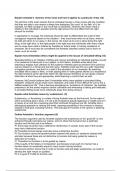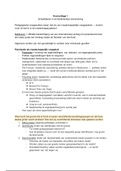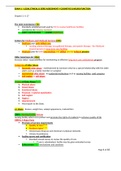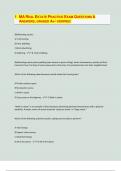Explain Aristotle’s’ doctrine of the mean and how it applies to a particular virtue (12)
The doctrine of the mean asserts that an individual having a virtue comes with the condition
that they are able to use reason to keep from displaying ‘too much’ or ‘too little’ of it, for
example, too little courage or too much fear is cowardice. However, the mean virtue is
relative to the individual in question and the right amount for one differs from the right
amount for another.
In application to courage, the individual should be able to differentiate the scale of their
courageous response based on the situation – they must know when to be brave, when to
be bold and when to run away. In this sense, the mean at its core is about doing the right
thing, at the right time, to the right people in the right way and individuals with many virtues
and no vices have what is dubbed by Aristotle as ‘ethica arete’ or having excellence of
character. But it must also be considered that Aristotle classifies certain acts to have no
mean, such as murder.
Explain how Aristotelian ethics might be applied to the issues of simulated killing (12)
Simulated killing is an imitation of killing and may be something an individual watches as part
of an audience or takes part in as a player. In his Poetics, Aristotle wrote about how
watching a tragedy was cathartic for the audience whereby pent-up emotions from previous
scenes release in a climax and are then gone. Aristotle would see this as a safe ‘cleansing’
of negative emotions, and that it is a part of the education of our character. By watching
simulated kills in plays or films, or even playing them in video games allows us to experience
the right emotions at the right time within the right amount therefore we can grasp a clearer
distinction of when they are appropriate, whilst learning to control them as well.
However, McCormick believes that if Aristotelian ethics were applied to simulated killing,
Aristotle's viewpoint would ‘erode one’s character, and make it more difficult for one to live a
fulfilled eudaimonic life.’ This is because developing an ‘excellence of character’ (as Aristotle
preaches to be the prime) requires careful cultivation and witnessing or taking part habitually
in simulated killing would move individuals away from being virtuous.
Explain what Aristotle means by ‘eudaimonia’. (5)
Eudaimonia, or ‘flourishing’ is a state of living Aristotle sees as the final end, for the sake of
which everything else is done. It is not a life of pleasure-based happiness or wealth and isn’t
a means to an end but a supreme good that continues throughout our life. Aristotle took a
teleological approach to viewing the world, meaning everything in the universe is directed
towards a final goal, including humans. This final goal for humans in his opinion is attaining
eudaimonia.
Outline Aristotle’s’ function argument (5)
The function argument used by Aristotle explains that eudaimonia or the ‘good life’ is only
achieved through exercising our reason, aims to show that humans have a particular
function and the first part is as follows:
P1 Every type of person has a distinctive role/function in society; every part of the human
body has a distinctive function
P2 Therefore human beings must also have a distinctive function.
P3 Our function cannot be growth/nutrition (shared with plants) or sentience (shared with
animals) because these are not distinctive to humans but being guided by reason is
distinctive to humans.
C1 Therefore our function is to be guided by reason.
(This is guilty of the fallacy of composition: just because every part of a human has a
function does not necessarily equal to every human having function)
The second section shows that in order to function well and attain eudaimonia, we need to
develop the right virtues or qualities:
P4 X is good if it fulfils its function well
The doctrine of the mean asserts that an individual having a virtue comes with the condition
that they are able to use reason to keep from displaying ‘too much’ or ‘too little’ of it, for
example, too little courage or too much fear is cowardice. However, the mean virtue is
relative to the individual in question and the right amount for one differs from the right
amount for another.
In application to courage, the individual should be able to differentiate the scale of their
courageous response based on the situation – they must know when to be brave, when to
be bold and when to run away. In this sense, the mean at its core is about doing the right
thing, at the right time, to the right people in the right way and individuals with many virtues
and no vices have what is dubbed by Aristotle as ‘ethica arete’ or having excellence of
character. But it must also be considered that Aristotle classifies certain acts to have no
mean, such as murder.
Explain how Aristotelian ethics might be applied to the issues of simulated killing (12)
Simulated killing is an imitation of killing and may be something an individual watches as part
of an audience or takes part in as a player. In his Poetics, Aristotle wrote about how
watching a tragedy was cathartic for the audience whereby pent-up emotions from previous
scenes release in a climax and are then gone. Aristotle would see this as a safe ‘cleansing’
of negative emotions, and that it is a part of the education of our character. By watching
simulated kills in plays or films, or even playing them in video games allows us to experience
the right emotions at the right time within the right amount therefore we can grasp a clearer
distinction of when they are appropriate, whilst learning to control them as well.
However, McCormick believes that if Aristotelian ethics were applied to simulated killing,
Aristotle's viewpoint would ‘erode one’s character, and make it more difficult for one to live a
fulfilled eudaimonic life.’ This is because developing an ‘excellence of character’ (as Aristotle
preaches to be the prime) requires careful cultivation and witnessing or taking part habitually
in simulated killing would move individuals away from being virtuous.
Explain what Aristotle means by ‘eudaimonia’. (5)
Eudaimonia, or ‘flourishing’ is a state of living Aristotle sees as the final end, for the sake of
which everything else is done. It is not a life of pleasure-based happiness or wealth and isn’t
a means to an end but a supreme good that continues throughout our life. Aristotle took a
teleological approach to viewing the world, meaning everything in the universe is directed
towards a final goal, including humans. This final goal for humans in his opinion is attaining
eudaimonia.
Outline Aristotle’s’ function argument (5)
The function argument used by Aristotle explains that eudaimonia or the ‘good life’ is only
achieved through exercising our reason, aims to show that humans have a particular
function and the first part is as follows:
P1 Every type of person has a distinctive role/function in society; every part of the human
body has a distinctive function
P2 Therefore human beings must also have a distinctive function.
P3 Our function cannot be growth/nutrition (shared with plants) or sentience (shared with
animals) because these are not distinctive to humans but being guided by reason is
distinctive to humans.
C1 Therefore our function is to be guided by reason.
(This is guilty of the fallacy of composition: just because every part of a human has a
function does not necessarily equal to every human having function)
The second section shows that in order to function well and attain eudaimonia, we need to
develop the right virtues or qualities:
P4 X is good if it fulfils its function well












